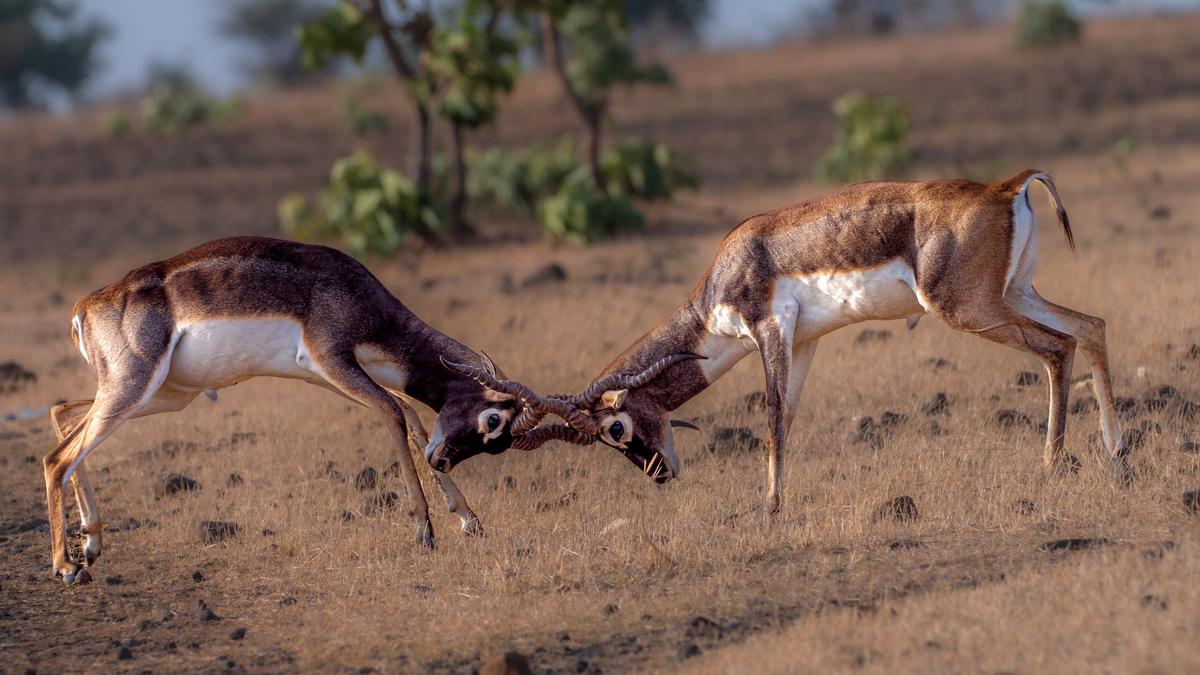
Of grasslands, blackbucks, and pastoral nomads Premium
The Hindu
Sumanth Kuduvalli's film Land of the Blackbuck highlights the importance of grasslands and conservation efforts in India.
“My first sighting of a male blackbuck was ethereal. This huge, big male with horns sticking out like swords, body glistening, standing against the sun in the morning,” remembers the Bengaluru-based natural history filmmaker and the co-founder of Trailing Wild Productions, Sumanth Kuduvalli. It was in 2013 at Maidanahalli at the Jayamangali Blackbuck Reserve, in Tumakuru. His film Land of the Blackbuck: A Story of Hope and Resilience, whichpremiered in Bengaluru earlier this month, chronicles his long association with the captivating animal.
He knew he wanted to film them even back then, but unfortunately, the idea fizzled out due to unforeseen circumstances. ”Then, in 2020, seven years later, an opportunity to revisit that dream cropped up. He had just returned to Bengaluru from North Karnataka, where he was filming hornbills for Jungle Lodges and Resorts (JLR), when they asked him if there was a pet project that he wanted to do, one that they could support logistically, he recalls. “So, I told them about this blackbuck project.”
It turned out that JLR had a property in Bidar, and they offered to host him there while he filmed the blackbuck. He began researching for the film, soon realising that there was very little literature about the wildlife of Bidar, except for one paper that H.N. Kumara, a faculty member at the Salim Ali Centre for Ornithology and Natural History (SACON), had written. “But that was mostly just a reference to Bidar, so I went there, mostly shooting in the dark,” says Sumanth, whose film is based on his encounters with the grasslands of Bidar.
It was only when he visited and began talking to its inhabitants that he realised “that the land had more to offer than what could be seen on the surface,” he says, recounting the names of some of the people who helped him on this journey, such as Vinay Malge of Team Yuvaa, a volunteer-based organisation based out of Bidar, UNESCO researcher, Majid Labbaf Khaneiki and naturalist Vivek Baburao.
In 2021, he applied for and received a fellowship from Jackson Wild, a non-profit based out of Wyoming, USA, which describes itself as “an inclusive global forum, inspiring our community, celebrating excellence in storytelling that illuminates our connection to the natural world and collective responsibility to the wild.” As part of the fellowship, he attended a workshop where the fellows were mentored by a leading professional in the industry, he says. “I was partnered with a BBC producer and director, Simon Baxter, and then the story started to take shape,” relates Sumanth. “We realised that it could be a full-fledged film on grasslands.”
As a child, growing up in Bengaluru, one of Sumanth’s favourite hangouts was a patch of swamp on the campus of the Indian Institute of Science. “I studied in the Kendriya Vidyalaya here and would spend a lot of time in this place, watching geckos, frogs, snakes…” he says. “I found refuge in it.”
Not surprisingly, he also thoroughly enjoyed watching nature documentaries, which his school made the students watch. “(I was) fascinated to see that something I enjoyed watching in action was happening on TV. And I remember thinking that it was such a beautiful thing to do.”

 Run 3 Space | Play Space Running Game
Run 3 Space | Play Space Running Game Traffic Jam 3D | Online Racing Game
Traffic Jam 3D | Online Racing Game Duck Hunt | Play Old Classic Game
Duck Hunt | Play Old Classic Game











